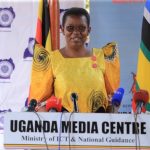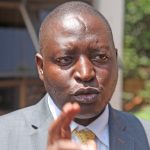The Uganda AIDS commission has called upon religious leaders to join the fight to fulfill the 95-95-95 target by 2030 as Uganda works to maintain the country’s progress in the fight against HIV/AIDS despite the impact of COVID-19 which resulted in a spike in new infections, especially among teenage females.
According to Ms Hope Murungi, the coordinator of the private sector and Civil society in Uganda AIDS Commission, the religious leader’s arrangement is among the robust strategies for implementing the presidential Fast Track Initiative(PFTI) of ending AIDS by 2030 which was launched by President Museveni in 2017.
“Among other strategies was to engage men in HIV Prevention and close the tap on new infections, particularly among adolescent girls and young women, accelerate implementation and treat and attainment of the fast track 95-95-95 targets, particularly among men and young people,” she said.
Others include Consolidating progress on the elimination of mother –to child transmission of HIV, Ensuring financial sustainability for the HIV response, and Ensuring institutional effectiveness for a well-coordinated multi-sector response.
Ms Murungi noted that Uganda is walking the lane as set by the United Nations Programme on HIV/AIDS (UNAIDS) where 95 percent of all people living with HIV will know their HIV status, 95 percent of all people with diagnosed HIV infection will receive sustained ART and 95 percent of all people receiving ART will have viral load suppression.
According to Dr Stephen, the Anglican church of Uganda’s head of health directorate and health services, they are engaging the religious leaders in the whole country to sustain the HIV/AIDS conversations among the folks to eliminate stigma and increase testing for HIV among men.
“We have engaged religious leaders in Busoga , Bunyoro, Kampala Teso, Mable, and Ankole to help us incorporate the HIV/AIDS conversation in their daily sermons in their respective religions to end the scourge by 2030,” he said.
He revealed that the recent report from Uganda AIDS Commission indicates progress in 95-95-95 targets whereby 80.9 percent of adults living with HIV between 15 and above are aware of their HIV status, 96.1 percent are on ART and 92.2 percent have their viral load suppressed.
Dr Kayiso Fregensio Mawanda, the inter-religious council Uganda manager in charge of livelihood and environment stewardship notes that the council is working closely with the AIDS commission to train religious leaders on how to disseminate the message on HIV/AIDS fight and prevention.
“We are partnering with the AIDS commission to train religious leaders, especially on what should be done to end HIV/AIDS by 2030 and enrich their message with informed views because they meet all classes of people,” he said.
The remarks were made during a meeting with religious leaders from greater Masaka on Tuesday where the commission equally told this publication that their next meeting will be focusing on cultural leaders, traditionalists, and herbalists to have a collective effort from all the leaders.
Uganda has about 1.4 million people living with HIV/AIDS, 1.2 million are on treatment and Uganda was among the eight countries that achieved 90-90-90 targets of UNAIDS in 2020.








